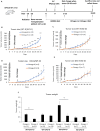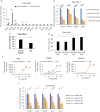Effect of omega-3 fatty acid diet on prostate cancer progression and cholesterol efflux in tumor-associated macrophages-dependence on GPR120
- PMID: 37872251
- PMCID: PMC11035487
- DOI: 10.1038/s41391-023-00745-4
Effect of omega-3 fatty acid diet on prostate cancer progression and cholesterol efflux in tumor-associated macrophages-dependence on GPR120
Abstract
Background: Preclinical and clinical translational research supports the role of an ω-3 fatty acid diet for prostate cancer prevention and treatment. The anti-prostate cancer effects of an ω-3 diet require a functional host g-protein coupled receptor 120 (GPR120) but the underlying effects on the tumor microenvironment and host immune system are yet to be elucidated.
Methods: Friend leukemia virus B (FVB) mice received bone marrow from green fluorescent protein (GFP) labeled GPR120 wild-type (WT) or knockout (KO) mice followed by implanting Myc-driven mouse prostate cancer (MycCap) allografts and feeding an ω-3 or ω-6 diet. Tumor associated immune cells were characterized by flow cytometry, and CD206+ tumor infiltrating M2-like macrophages were isolated for gene expression studies. MycCap prostate cancer cell conditioned medium (CM) was used to stimulate murine macrophage cells (RAW264.7) and bone marrow-derived (BMD) macrophages to study the effects of docosahexanoic acid (DHA, fish-derived ω-3 fatty acid) on M2 macrophage function and cholesterol metabolism.
Results: The bone marrow transplantation study showed that an ω-3 as compared to an ω-6 diet inhibited MycCaP allograft tumor growth only in mice receiving GPR120 WT but not GPR120 KO bone marrow. In the ω-3 group, GPR120 WT BMD M2-like macrophages infiltrating the tumor were significantly reduced in number and gene expression of cholesterol transporters Abca1, Abca6, and Abcg1. RAW264.7 murine macrophages and BMDMs exposed to MycCaP cell CM had increased gene expression of cholesterol transporters, depleted cholesterol levels, and were converted to the M2 phenotype. These effects were inhibited by DHA through the GPR120 receptor.
Conclusion: Host bone marrow cells with functional GPR120 are essential for the anticancer effects of dietary ω-3 fatty acids, and a key target of the ω-3 diet are the M2-like CD206+ macrophages. Our preclinical findings provide rationale for clinical trials evaluating ω-3 fatty acids as a potential therapy for prostate cancer through inhibition of GPR120 functional M2-like macrophages.
© 2023. This is a U.S. Government work and not under copyright protection in the US; foreign copyright protection may apply.
Conflict of interest statement
The authors declare no competing interests.
Figures





References
-
- Saw CL, Wu TY, Paredes-Gonzalez X, Khor TO, Pung D, Kong AN. Pharmacodynamics of fish oil: protective effects against prostate cancer in TRAMP mice fed with a high fat western diet. Asian Pac J Cancer Prev. 2011;12:3331–4. - PubMed
MeSH terms
Substances
Grants and funding
- R01 HL158691/HL/NHLBI NIH HHS/United States
- R01 AG069698/AG/NIA NIH HHS/United States
- P50 CA092131/CA/NCI NIH HHS/United States
- P30 AG068345/AG/NIA NIH HHS/United States
- R01 CA231219/CA/NCI NIH HHS/United States
- P50CA92131/U.S. Department of Health & Human Services | NIH | National Cancer Institute (NCI)
- RO1CA231219/U.S. Department of Health & Human Services | NIH | National Cancer Institute (NCI)
- R01AG069698/U.S. Department of Health & Human Services | NIH | National Cancer Institute (NCI)
- P30AG068345/U.S. Department of Health & Human Services | NIH | National Cancer Institute (NCI)
- R01HL158691/U.S. Department of Health & Human Services | NIH | National Cancer Institute (NCI)
LinkOut - more resources
Full Text Sources
Medical
Research Materials
Miscellaneous

